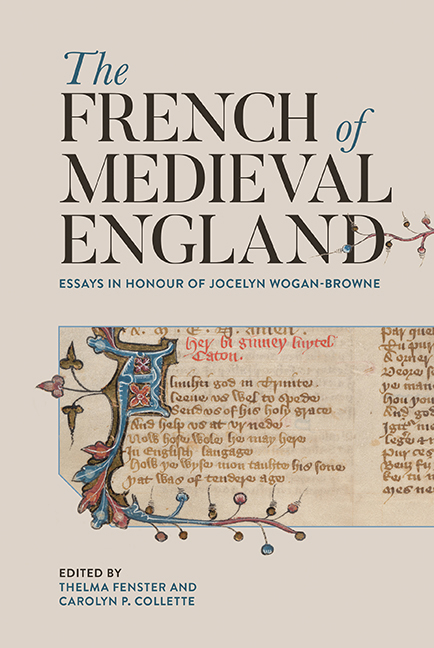Book contents
- Frontmatter
- Contents
- List of Illustrations
- List of Contributors
- List of Abbreviations
- Foreword: ‘The Light I Never Left Behind’: Jocelyn Wogan-Browne
- Introduction: Recognizing the French of Medieval England
- 1 The Gloss to Philippe de Thaon's Comput and the French of England's Beginnings
- 2 The Scandals of Medieval Translation: Thinking Difference in Francophone Texts and Manuscripts
- 3 Contrafacture and Translation: The Prisoner's Lament
- 4 Complaining about the King in French in Thomas Wright's Political Songs of England
- 5 The Chanson d’Aspremont in Bodmer 11 and Plantagenet Propaganda
- 6 The Use of Anglo-Norman in Day-to-Day Communication during the Anglo-Scottish Wars (1295–1314)
- 7 Middle English Borrowing from French: Nouns and Verbs of Interpersonal Cognition in the Early South English Legendary
- 8 William Langland Reads Robert Grosseteste
- 9 Disability Networks in the Campsey Manuscript
- 10 English Women and Their French Books: Teaching about the Jews in Medieval England
- 11 French Residents in England at the Start of the Hundred Years War: Learning English, Speaking English and Becoming English in 1346
- 12 French Immigrants and the French Language in Late-Medieval England
- 13 Fashioning a Useable Linguistic Past: The French of Medieval England and the Invention of a National Vernacular in Early Modern France
- 14 Admiring Ambivalence: on Paul Meyer's Anglo-Norman Scholarship
- 15 Twenty-First Century Gower: The Theology of Marriage in John Gower's Traitié and the Turn toward French
- 16 Royaumes sans frontières: The Place of England in the Long Twelfth Century
- Afterword
- Bibliography
- Index
- Publications of Jocelyn Wogan-Browne
- Tabula Gratulatoria
14 - Admiring Ambivalence: on Paul Meyer's Anglo-Norman Scholarship
Published online by Cambridge University Press: 12 August 2020
- Frontmatter
- Contents
- List of Illustrations
- List of Contributors
- List of Abbreviations
- Foreword: ‘The Light I Never Left Behind’: Jocelyn Wogan-Browne
- Introduction: Recognizing the French of Medieval England
- 1 The Gloss to Philippe de Thaon's Comput and the French of England's Beginnings
- 2 The Scandals of Medieval Translation: Thinking Difference in Francophone Texts and Manuscripts
- 3 Contrafacture and Translation: The Prisoner's Lament
- 4 Complaining about the King in French in Thomas Wright's Political Songs of England
- 5 The Chanson d’Aspremont in Bodmer 11 and Plantagenet Propaganda
- 6 The Use of Anglo-Norman in Day-to-Day Communication during the Anglo-Scottish Wars (1295–1314)
- 7 Middle English Borrowing from French: Nouns and Verbs of Interpersonal Cognition in the Early South English Legendary
- 8 William Langland Reads Robert Grosseteste
- 9 Disability Networks in the Campsey Manuscript
- 10 English Women and Their French Books: Teaching about the Jews in Medieval England
- 11 French Residents in England at the Start of the Hundred Years War: Learning English, Speaking English and Becoming English in 1346
- 12 French Immigrants and the French Language in Late-Medieval England
- 13 Fashioning a Useable Linguistic Past: The French of Medieval England and the Invention of a National Vernacular in Early Modern France
- 14 Admiring Ambivalence: on Paul Meyer's Anglo-Norman Scholarship
- 15 Twenty-First Century Gower: The Theology of Marriage in John Gower's Traitié and the Turn toward French
- 16 Royaumes sans frontières: The Place of England in the Long Twelfth Century
- Afterword
- Bibliography
- Index
- Publications of Jocelyn Wogan-Browne
- Tabula Gratulatoria
Summary
Parisian scholars Paul Meyer (1840–1917) and Gaston Paris (1840–1903) were the pre-eminent French Romance philologists in the period 1870–1914 (between the Franco-Prussian War and the First World War), when medieval French, and comparative Romance philology, were first becoming firmly established as serious academic disciplines. In both their teaching and their scholarly publishing, Paris and Meyer were instrumental in determining the place of Anglo-Norman within the discipline of French, both in France and abroad.
Although their work was seen as both ground breaking and prolific in the last quarter of the nineteenth century, as Jocelyn Wogan-Browne and other critics at the end of the twentieth century and the beginning of the twenty-first century have ably demonstrated, the scholarship of Paris and Meyer also reflected a strong nationalistic bias, in which Anglo-Norman, for example, was routinely found wanting in comparison to what they perceived as Parisian-centred francien. In what follows I will argue that despite the fact that both Paris and Meyer denigrated Anglo-Norman, and despite the fact that their long and remarkably intertwined careers may lead us to believe they had indissociably similar scholarly opinions, a closer look at the work of Meyer shows that he often diverged significantly from the views expressed by Paris. In fact, it was only Paris who was expansively outspoken in his denunciation of the ‘debased’ French written in England. In contrast, Meyer's restrained (if not purely reflexive) denigration of Anglo-Norman was consistently subordinate to his excitement in the discovery of new Anglo-Norman writing. In his analytical description of these works there was always an inescapable ambivalence, but it is an ambivalence in which Meyer was always moved by a strong ‘pull toward’, that offset his occasional ‘push against’ Anglo-Norman.
Born in the same year as Paris, Meyer emerged professionally, as it were, fully formed from the Ecole des Chartes, which he entered in 1857 at the age of seventeen. Paris had the added advantage (or impediment) of an academic father, Paulin Paris, who in 1853 had been appointed to the first chair of medieval French language and literature at the College de France. Gaston first spent two years studying philology (and German) in Germany (and later declared himself a disciple of the leading German romance philologist, Friedrich Diez).
- Type
- Chapter
- Information
- The French of Medieval EnglandEssays in Honour of Jocelyn Wogan-Browne, pp. 241 - 256Publisher: Boydell & BrewerPrint publication year: 2017



